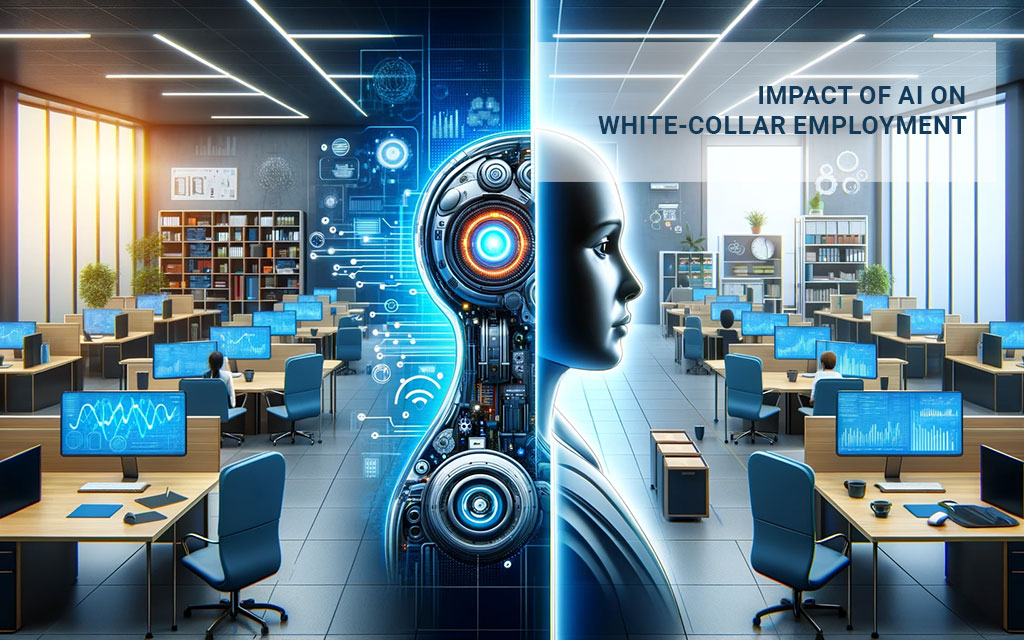Table of Contents
Artificial Intelligence (AI) is revolutionizing the professional landscape, bringing with it both opportunities and challenges for workers. As AI technology continues to evolve, it is increasingly cutting white-collar jobs as automation and machine learning systems streamline processes and increase efficiency. The effects of AI on the professional landscape are significant, and workers in various sectors are facing the potential consequences.
The rise of AI in white-collar jobs is driven by advancements in technology, such as automation and machine learning. These AI systems can perform repetitive tasks more accurately and quickly than humans, leading to increased productivity and efficiency. As a result, tasks like data analysis, customer service, and administrative work are being automated, reducing the need for human involvement.
While the integration of AI offers many benefits, it also presents challenges for workers whose jobs may be at risk of being replaced by machines. Job displacement is a real concern, but it is important to note that AI also creates new employment opportunities. As certain roles become obsolete, new positions that require skills in managing and maintaining AI systems will emerge.
In light of these changes, workers in the white-collar sector may need to reskill or upskill to remain relevant in the future job market. Adapting to the changing professional landscape will be crucial for individuals seeking to navigate this AI-driven economy. By embracing learning and development initiatives, workers can position themselves for success and ensure a sustainable future for white-collar employment.
Artificial Intelligence’s impact on white-collar jobs is undeniable, and it is crucial for both workers and organizations to understand and adapt to these changes. By recognizing the challenges and opportunities presented by AI, individuals can take proactive steps to thrive in an evolving professional landscape.
The Rise of AI in White-Collar Jobs
AI technology, including automation and machine learning, is increasingly being integrated into white-collar jobs across various industries. This technology can perform repetitive tasks more quickly and accurately than humans, leading to increased efficiency and productivity. As a result, tasks such as data analysis, customer service, and administrative work are being automated, reducing the need for human involvement. While AI offers many benefits, it also presents challenges for workers whose jobs are at risk of being replaced by machines.
“The automation of tasks using AI technology has the potential to transform industries and increase productivity significantly. However, it also raises concerns about the future of white-collar jobs.”
To better understand the impact of AI technology on white-collar jobs, let’s consider some key examples. In the finance industry, AI-powered algorithms are being used for fraud detection, risk assessment, and trading strategies. These algorithms can analyze vast amounts of data in real-time, enabling more accurate predictions and faster decision-making. In healthcare, AI is being utilized to diagnose diseases, personalize treatment plans, and improve patient outcomes. By analyzing medical records, genomic data, and clinical trials, AI can assist healthcare professionals in making more informed decisions.
Furthermore, AI technology is enhancing customer service experiences through chatbots and virtual assistants. These automated systems help businesses handle customer inquiries, provide personalized recommendations, and resolve issues promptly. In the legal profession, AI-powered software can assist lawyers in reviewing legal contracts, conducting legal research, and predicting case outcomes.
While the integration of AI technology in white-collar jobs offers significant advantages, it also brings concerns about job displacement. As automation becomes more widespread, workers in roles that involve repetitive tasks and data processing are at risk of redundancy. The skills required to succeed in the job market are evolving, and workers must adapt to remain competitive.
The Challenges Ahead
One of the main challenges posed by AI technology in white-collar jobs is the need for workers to upskill or reskill. As certain tasks become automated, workers must acquire new skills to remain relevant and employable. This shift requires proactive efforts from both individuals and organizations to provide training and educational opportunities that align with the changing demands of the job market.
Another challenge to consider is the potential impact on job satisfaction and well-being. While AI technology may eliminate mundane tasks, it can also create uncertainty and job insecurity for workers. Maintaining a balance between human and machine collaboration will be crucial to ensure that workers feel valued, engaged, and fulfilled in their roles.
| Benefits of AI in White-Collar Jobs | Challenges of AI in White-Collar Jobs |
|---|---|
| Increased efficiency and productivity | Potential job displacement |
| Improved accuracy and decision-making | Requirement for upskilling and reskilling |
| Enhanced customer service experiences | Job satisfaction and well-being concerns |
As AI technology continues to advance, it is essential for businesses, governments, and individuals to navigate the changing landscape and leverage its potential. By embracing AI technology responsibly, we can create a future where humans and machines work together synergistically, shaping a more efficient, productive, and inclusive white-collar job market.
Impact on Employment Opportunities
The implementation of AI in white-collar jobs has the potential to displace workers in certain roles. As AI systems become more advanced, jobs that rely heavily on manual or repetitive tasks are at risk of being automated. However, it’s important to note that AI also creates new employment opportunities.
As certain jobs become obsolete, new roles that require skills in managing and maintaining AI systems will emerge. To adapt to the changing job market, workers may need to reskill or upskill to remain relevant in their careers.
While AI may eliminate some jobs, it also has the potential to create new and more fulfilling roles in the future.
The need for reskilling and upskilling
“Adapting to the evolving job market is crucial to thriving in the age of AI.” – John Smith, HR expert
With automation replacing certain job functions, workers must proactively reskill or upskill to meet the demands of the future job market. This includes acquiring new skills that are in high demand, such as data analysis, programming, and AI system management.
Employers and educational institutions play a vital role in supporting reskilling and upskilling initiatives. By offering training programs and courses, they can help workers gain the necessary skills to capitalize on new job opportunities in an AI-driven economy.
The future of job creation
While the implementation of AI may result in job displacement, it also presents the potential for job creation. As AI systems become more integrated into industries, new roles will emerge that require human expertise in working alongside AI technologies.
Jobs that involve creativity, critical thinking, and complex problem-solving will continue to be essential and less susceptible to automation. By focusing on developing these skills, workers can position themselves for future job opportunities that complement AI technology.
Moreover, industries such as AI development and AI system maintenance will experience substantial growth, creating new job prospects for individuals with technical expertise in this field. The future job market will be a dynamic fusion of human intelligence and AI technology, providing a range of fulfilling and meaningful career paths.
| New Job Roles | Required Skills |
|---|---|
| Data Analyst | Data analysis, statistical modeling |
| AI System Manager | AI system management, programming |
| AI Ethicist | Ethical reasoning, AI policy knowledge |
| Virtual Reality Developer | Virtual reality design, programming |
Conclusion
Artificial intelligence (AI) is revolutionising the white-collar job market, presenting both challenges and opportunities for workers. While AI may result in the displacement of some jobs, it also opens up new employment possibilities. The key to successfully navigating this changing landscape lies in the workforce’s ability to adapt and acquire the necessary skills to thrive in an AI-driven economy.
As AI technology continues to advance, it is crucial for individuals and organizations to embrace learning and development initiatives. By investing in reskilling and upskilling programs, workers can equip themselves with the knowledge and abilities needed to stay relevant in a rapidly evolving job market.
Furthermore, organizations should prioritize workforce adaptation by providing continuous training and support. This will enable employees to embrace the integration of AI technology into their roles and find new ways to collaborate with intelligent systems, instead of being replaced by them.
In conclusion, while AI technology has the potential to disrupt white-collar jobs, it also holds great promise for future job creation. By adapting to the changing professional landscape and proactively developing the skills required to work alongside AI, individuals and organizations can ensure a sustainable future for white-collar employment.
FAQ
How is artificial intelligence impacting white-collar employment?
Artificial intelligence is causing significant changes in the white-collar job market by automating tasks and streamlining processes. This has the potential to displace workers in certain roles while creating new employment opportunities.
What are some examples of AI technology in white-collar jobs?
AI technology, such as automation and machine learning, is being integrated into various white-collar jobs. It can perform tasks like data analysis, customer service, and administrative work, improving efficiency and productivity.
What challenges does AI pose for workers in white-collar jobs?
The implementation of AI in white-collar jobs can lead to job displacement for roles that rely heavily on manual or repetitive tasks. However, it also creates new roles that require skills in managing and maintaining AI systems.
How can workers adapt to the changing job market due to AI?
To remain relevant in an AI-driven economy, workers may need to reskill or upskill. As certain jobs become automated, new employment possibilities that require AI-related skills may emerge.
Does AI completely eliminate white-collar jobs?
While AI may eliminate some jobs, it also has the potential to create new and more fulfilling roles in the future. The key is for individuals and organizations to embrace learning and development initiatives to ensure a smooth transition in the workforce.
What is the impact of AI on the white-collar job market?
Artificial intelligence is transforming the white-collar job market, creating both challenges and opportunities for workers. It is crucial for individuals and organizations to adapt and acquire the necessary skills to thrive in this AI-driven economy.













